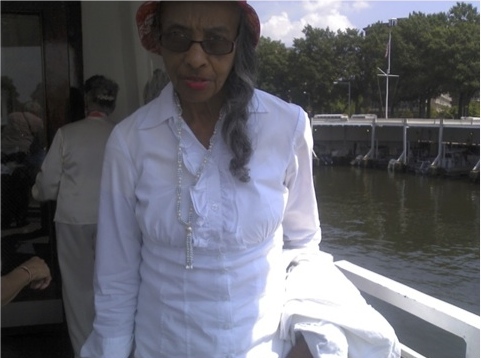In recognition of National Minority Health Month, the Diverse Elders Coalition is featuring stories relevant to the health disparities and health issues affecting diverse older adults during April. A new story will be shared every Wednesday with additional posts shared throughout the month. Be sure to visit diverseelders.org regularly during the month of April.
My stepmother, Miss Fannie embodies this year’s National Minority Health Month theme “Prevention is Power: Taking Action for Health Equity.” She didn’t always. She used to be one of the statistics that abound in the African American community about Black people. You see as an African American adult female, aged 65+, with less than a college education, she was among the percentage of people with uncontrolled hypertension, and in the group of elders with uncontrolled diabetes whose “sugar” dropped on a regular basis. Miss Fannie also lived a somewhat isolated and sedentary life and tipped the scales at over 200 pounds, becoming part of the largest cohort of obese individuals in the country – yes, African American women.
We know that many of these outcomes are the result of health and economic disparities, cultural barriers and outright discrimination. However, I contend that programs and initiatives that provide culturally appropriate and consistent messaging, and foster awareness and encourage simple changes – do supply the tools required to induce steps toward positive changes and can improve health.
Miss Fannie’s health did improve. Almost four years ago, at age 76, Miss Fannie began to attend one of the DC Office on Aging Senior Wellness Centers three times a week. The Center picked her up at her home and brought her home in the evening. The workers called her Ms. Woody or Miss Fannie and called when she was not out waiting on the porch. She became less isolated and made friends with many people who were her peers and had similar life experiences. In addition to a nutritional lunch and the traditional bingo, she and her companions learned about and participated in a City activity. One day my nonpolitical stepmother is telling us she participated in a conversation with the Mayor at a senior forum she attended!! [My silent response although positive, took a deeper dive to: who are you and where is my stepmother??]
In addition, Miss Fannie received a monthly calendar of programs of potential interest that the elders could choose to do or not, like seeing a show at the Kennedy Center or going on a cruise down the Potomac. However, they received regular education that was not optional on the value of nutrition; the importance of eating good food in the treating of diabetes and hypertension; portion control and identifying ways to limit sodium and sugar intake. Another Center program that was non-negotiable was the exercise program. Older adults were treated weekly and sometimes more often to guided walks around the block; dancing for fun and fitness; and chair exercises.
Sometime during her second year at the Center, she informed me that eating white bread was not good for her – she was going to purchase wheat bread from now on and she would begin to eat turkey bologna instead of beef bologna because turkey was easier for the body to digest. She was going to stop drinking her regular tea staple, for the more healthy green tea. Moreover, a formally sedentary and obese Miss Fannie is now a size 10 and a walking enthusiast. She walks somewhere every day and brags about being able to walk faster and farther than some of the younger program participants. The indication exists that gradually and over time, with the help of the DC Office on Aging’s holistic approach to aging; the incredible supportive staff; culturally sensitive staffing and relevant, consistent messaging, Miss Fannie’s health and wellness habits changed and her quality of life improved. Caring and treating the “whole” person in a respectful manner works. Culturally appropriate and consistent messaging works. Just look at Miss Fannie…
Dr. Imani Woody is the CEO of Mary’s House for Older Adults, Inc. and the SAGE Metro DC representative to SAGENet – SAGE’s network of local affiliates around the country – that work to reduce isolation, improve financial security and enhance quality of life for LGBT older adults. The opinions expressed in this article are those of the author and do not necessarily reflect those of the Diverse Elders Coalition.
READ OUR OTHER NATIONAL MINORITY HEALTH MONTH STORIES:
Health Benefits of Pet Ownership for Older Adults (National Minority Health Month)


